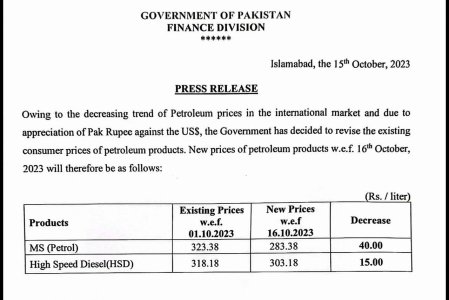- Joined
- Aug 12, 2023
- Runs
- 18,445
Federal government is charging exorbitant taxes/other charges before refining and on the finished petroleum products.
As such, inflation-hit consumers are paying much more amount than the actual import and refining costs.
Petroleum products are a major source of revenue generation for the cash-strapped government and the public at large is the ultimate sufferer.
By keeping the petroleum products prices at the minimum possible level and looking for alternative revenue generation sources, the government can give a big relief to the masses. The reason is that petroleum prices affect all other necessities of life and sectors of the economy.
As per people relating to the petroleum sector and media reports, the actual price of petrol without taxes is about Rs161 and that of diesel is Rs166 per litre.
The petroleum products are being sold at its current price after addition of exorbitant taxes and other charges like petroleum development levy, rent, and distribution and dealer margins.
The overall taxes on petrol are to the tune of Rs91.36 and that on diesel Rs87.49 per litre.
Taxes on petrol and diesel before refining are Rs19.53.
Moreover, taxes levied on refined petrol are Rs71.83 per litre. The ex-refinery price of petrol is Rs181.70 per litre.
The taxes imposed on refined diesel are Rs67.96 per litre and the ex-refinery price of the product is Rs190.21 per litre.
As such, inflation-hit consumers are paying much more amount than the actual import and refining costs.
Petroleum products are a major source of revenue generation for the cash-strapped government and the public at large is the ultimate sufferer.
By keeping the petroleum products prices at the minimum possible level and looking for alternative revenue generation sources, the government can give a big relief to the masses. The reason is that petroleum prices affect all other necessities of life and sectors of the economy.
As per people relating to the petroleum sector and media reports, the actual price of petrol without taxes is about Rs161 and that of diesel is Rs166 per litre.
The petroleum products are being sold at its current price after addition of exorbitant taxes and other charges like petroleum development levy, rent, and distribution and dealer margins.
The overall taxes on petrol are to the tune of Rs91.36 and that on diesel Rs87.49 per litre.
Taxes on petrol and diesel before refining are Rs19.53.
Moreover, taxes levied on refined petrol are Rs71.83 per litre. The ex-refinery price of petrol is Rs181.70 per litre.
The taxes imposed on refined diesel are Rs67.96 per litre and the ex-refinery price of the product is Rs190.21 per litre.











